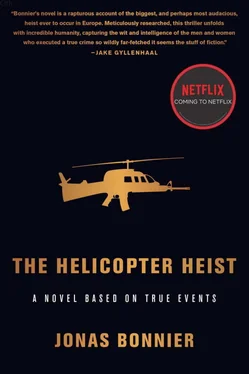The American walks over to the hangar door and studies it skeptically.
“These things are solid,” he says in his nasal English. “You can’t pick these. This needs to be blown open.”
“Right, right,” Maloof agrees.
And then he laughs. It’s comical. The door into the hangar is as secure as can be. They probably installed it on the recommendation of the insurance company, in some attempt to lower their premiums. Blowing it open would work, but the charge would also echo across the entire neighborhood.
Maloof takes out the long-bladed knife that he had been wearing in a holster beneath his coat. He goes over to the door.
“That’ll never work,” says the American, as though Maloof had been planning to attack the steel door with his blade.
But instead, he cuts a long slash into the canvas of the hangar, right next to the door. Since the hangar is made from fabric, he doesn’t even have to exert himself. One more cut, and he’s managed to create a flap that can be pushed to one side, and with a welcoming gesture and a grin, he invites Petrovic and the surprised pilot into the hangar.
Petrovic laughs.
“Smart of them to buy an expensive door.”
Maloof’s grin grows wider, and he follows them in.
The helicopter, a white Bell 206 JetRanger, is where it should be, at the end of its row, making it relatively easy to roll out.
So far, everything is just as Manne Lagerström had promised.
The American quickly inspects the machine. The hangar smells of gasoline and electronics, and the huge, empty helicopters are lined up in three rows. Maloof can’t help but liken them to bees. It’s as though they’ve flown in to rest for the night, and come dawn they’ll wake up again, their heavy, drooping rotor blades suddenly starting to spin, panels lighting up and engines roaring.
Kluger walks around the helicopter, occasionally raising his hand to the metal body. He climbs up and inspects the rotor blades and the mechanics. Maloof and Petrovic leave him to it and head back out to carry in the weapons and petrol cans from the car. When they return, the pilot has finished his checks. Everything is as it should be, the tank only partially filled so that they can fly with a heavy load, and he gives them the thumbs-up. They manage to maneuver the helicopter out of the hangar using the small tractor. The wheels on the dolly move smoothly over the flat ground, possibly because Manne gave them an extra oiling ahead of tonight’s events.
The white helicopter glistens in the moonlight. Kluger starts the engine, and the rotor blades slowly come to life. A low whirring, rising to a controlled roar. After ten or so seconds of picking up speed, he can no longer see them; they’re just one great big spinning disc above the body of the helicopter.
“OK!” Petrovic shouts over the roar of the helicopter once they’ve loaded the weapons. “See you in a few hours, hopefully.”
“Right, right,” Maloof shouts back.
Kluger is already in his seat. He’s wearing ear protectors but no headphones. He isn’t planning to turn on the communications system during their flight. His feet are on the pedals and his hands on the levers. Petrovic has bought a pair of goggles, but Kluger doesn’t need them. In his experience, they’re more trouble than they’re worth.
Maloof takes his seat next to the American. The two bowl-shaped seats behind them are empty for now.
A second later, they lift off. The wind from the rotor blades tears at Petrovic’s clothes, and he watches the enormous white bumblebee fly away.
He turns around and rushes back to the car.
It’s almost five in the morning.
4:41 a.m.
The dark blue BMW is factory fresh, and the engine more powerful than the car Zoran Petrovic usually drives. He borrowed the vehicle direct from the reseller, a friend of a friend who owed him a favor or two. Petrovic’s part in the events of that early morning isn’t over yet.
He doesn’t have much time. He needs to make it from Norrtälje to Skärholmen in fifty minutes, and he’s going flat out. When they first talked about it, Maloof had said it was too tight, that they would need to find someone else, but Petrovic had insisted. He could do it.
Driving down the empty highway at 120 miles an hour that bright September night, the steering steady, Petrovic feels pure joy. The car isn’t swaying in the slightest, the engine nothing but a low whirr, and he turns on the radio. He needs music for this. “Run This Town,” by Jay-Z and Rihanna. The radio stations have been playing it all summer. He turns up the volume.
And that’s when he notices it.
The blue lights loom up in his rearview mirror. He has no idea where the police car has come from, he hasn’t overtaken any, but there’s no doubt it’s him they’re after. There aren’t any other cars on the road.
The goggles the helicopter pilot recently turned down are lying on the seat next to Petrovic. He realizes that he probably has traces of gunpowder on his clothes and his hands from checking the weapons earlier. And he also knows that if he doesn’t turn up at the agreed meeting point in time, there’ll be trouble.
He stares into the rearview mirror.
He still hasn’t slowed down. In fact, according to the speedometer, he is now doing 140 miles an hour.
The police are gaining on him. He won’t be able to lose them on the highway. But turning off now?
Petrovic doesn’t even know where he is.
5:02 a.m.
Since Ezra Ray returned with the cable for the detonators, not much has been said in the woods out in Stora Skuggan. He had found the cable lying beneath a plastic bag full of empty bottles.
At regular intervals, Sami walks over to the open field where the helicopter will land and squints up at the sky. He knows he will be able to hear it before he can see it, but he can’t sit still. The grass is damp with dew, and he can already feel the adrenaline building. It’s lying in wait to start pumping around his body in the next half an hour or so. Ideally, he would like to go for a quick run around the field, but he decides not to.
Nordgren has managed to find a stump that is more comfortable than the rock he was sitting on earlier. His weariness has vanished, but he doesn’t feel either nervous or expectant. It’s hard to explain. He can spend weeks and months planning something that, from the very beginning, is a real challenge; where every problem that he solves leaves him with a deep sense of satisfaction. But when the time finally comes, all that’s left is his desire to get it done. Nothing else.
“You’re not sleeping, are you?” Ezra asks from his rock a few yards away.
It’s a joke.
“No chance,” Nordgren replies quietly.
It’s two minutes past five when Sami’s phone rings. He is halfway back to the woods and he knows Nordgren will have heard it. Maloof’s voice is drowned out by the sound of the engine. Sami can’t hear what he’s saying, but from the context, it’s clear why he is calling.
They’re on their way.
A minute later, and the silence over Frescati and Stora Skuggan is broken.
It’s no more than a low whirring sound at first, way in the distance, but it completely possesses them.
Niklas Nordgren gets up and stands perfectly still.
Sami and Ezra, who had been going to bring the equipment to the field, stop where they are.
Listening.
Allowing the sound of the helicopter to grow louder.
It’s as though someone had turned the volume far above what the speakers can handle.
And, as though on command, Sami and Ezra drop the equipment and run with Nordgren into the dark field. They stop. They had measured out the triangle an hour or so earlier. They turn on the torches.
Читать дальше












